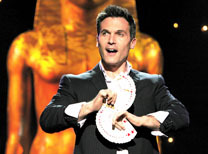What you'll see and hear at the installation
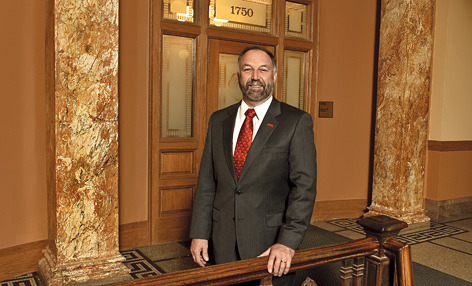
President Steven Leath. Photo by Bob Elbert.
Installation details
Iowa State history will be written Friday morning, when Steven Leath is installed as the university's 15th president. The 90-minute ceremony in Stephens Auditorium will include a colorful procession, Leath's vision for Iowa State and beautiful music that strikes a few Cyclone-pleasing chords. Here's a preview of what you can expect to see and hear at the event.
Academics, students show their colors
The ceremony will get off to a bright start when some 800 academics and students process into the auditorium.
The academic procession will include about 300 individuals, representing colleges and universities from around the country, learned societies and professional organizations, and Iowa State's academic departments, faculty and administration. The academics will wear the garb of the institutions they represent.
Marking the occasion in less traditional fashion will be approximately 500 student representatives who will process into the auditorium sporting cardinal T-shirts custom-designed for the installation. Check out the back of the shirts, emblazoned with Leath's license plate.
Stephens, Sept. 14
10-11:30 a.m., ceremony
11:45 a.m.-1 p.m., reception, Celebrity Café
CyRide orange route buses from central campus will stop near Stephens
A vision for Iowa State
After he is installed by state Board of Regents president Craig Lang, Leath will lay out his priorities and plans for Iowa State. The installation and convocation address is titled "Educate. Innovate. Achieve!" The text of Leath's speech will be available on the installation website later in the day.
A musical premiere
Music, of both classical and Cyclone genres, will be part of the installation. A new composition written by director of bands Michael Golemo will start things on the right note. "A Cyclone Fanfare," premiered by the ISU Wind Ensemble, will warm hearts among the cardinal and gold crowd.
"I used excerpts from the three school songs in a very symphonic and nontraditional way," Golemo said. "I also used a fourth unofficial school song that should be familiar to Jack Trice Stadium regulars."
Next on the musical roster will be internationally acclaimed bass-baritone Simon Estes. The university's F. Wendell Miller Distinguished Artist in Residence will perform twice, singing "The Star-Spangled Banner" and an aria from an opera by Giuseppe Verdi.
The Iowa State Singers, conducted by professor James Rodde, also will perform two pieces, including "The Bells of Iowa State."
Ceremonial trappings
Three ceremonial pieces will be part of the installation. Iowa State's mace symbolizes the authority of the university president. The chief faculty marshal leading the academic procession will carry the mace. A studded, armor-breaking weapon in medieval times, the modern mace is a staple in academic processions.
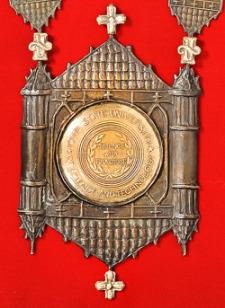
The presidential chain of office is worn on important ceremonial occasions. Photo by Bob Elbert.
The presidential chain of office symbolizes the rich history and traditions of Iowa State University and is worn by the president at important ceremonial occasions. It will be placed on Leath during the ceremony. The bronze and silver necklace is a relatively new addition to ISU tradition. It was first worn by former president Gregory Geoffroy at a 2008 commencement.
Leath will be robed in another piece of Iowa State tradition that debuted in 2008 -- Iowa State's doctorate regalia. The cardinal-colored gabardine gown features black velvet panels, edged with gold cord and adorned with the campanile.
On a historical note: The caps and gowns worn in American universities originated in medieval European universities. Function may have trumped fashion for the ancient scholars, who frequently worked in unheated buildings.
On stage
Joining president Leath on stage will be:
- U.S. Senators Charles Grassley and Tom Harkin
- Iowa Gov. Terry Branstad and Lt. Gov. Kim Reynolds
- Members of the state Board of Regents and its executive director Robert Donley
- Iowa State's vice presidents and deans
- Ames mayor Ann Campbell
- University of Iowa president Sally Mason and University of Northern Iowa faculty senate chair Jeffrey Funderburk
- Vocalist Simon Estes
- Erskine Bowles, emeritus president of the University of North Carolina system
- Representatives of faculty, professional and scientific staff, merit staff, undergraduate students, graduate and professional students, and the alumni, all of whom will provide a brief greeting to the president
- Installation committee chair and dean of the library Olivia Madison
- Announcer Hollis Monroe
- Installation marshalls
View the ceremony online
The installation is a university event. Employees may attend on work time, in coordination with their supervisors. Those who can't make it to Stephens Friday can view the ceremony live or later on the installation website.
Report to regents: Replace tuition set aside with state grant program
The practice of setting aside tuition dollars for student financial aid would disappear under a recommendation presented Sept. 12 to the state Board of Regents. It would be replaced, in part, by a not-yet-in-existence student aid program, funded with state dollars, that would assist only resident undergraduate students who demonstrate a financial need. The foundations affiliated with Iowa's three public universities also would be asked to conduct a five-year campaign (FY 2014-18) to raise funds for merit-based and other scholarships, also targeting resident undergraduate students.
The preliminary report and recommendations (PDF) are on the board's website. Iowans are invited to provide input on the proposal prior to the board's Oct. 24-25 meeting, when a final decision is expected. Comments may be emailed to regents@iastate.edu.
The proposed initial request to the state for a tuition grant program is $39.5 million (a slight increase over the $37.1 million in institutional aid provided to resident undergraduates with financial need at the three universities last year. That aid covered less than one-fifth of those students' financial need).
Through tuition set aside funds this year, Iowa State will award nearly $62 million in need-based and merit aid to undergraduates, both resident and non-resident.
Iowa is the only state in the country without a state need-based aid program for students attending its public universities, regents staff member Diana Gonzalez told board members. It does have such a program – nearly $50 million -- for Iowa students attending Iowa's private universities.
At the other end of the spectrum, almost 97 percent of the state of Arizona's need-based aid dollars go to students attending public universities there.
Regent David Miles said it's important that Iowans know that their public universities will be accessible to Iowa families with financial need.
"We have to remain open and affordable," he said.
Regent Bruce Rastetter asked for a commitment from the three foundations on their fundraising by the October meeting.
He said firm commitments from the state and the university foundations will result in a decrease in tuition for in-state students.
Board president Craig Lang called the recommendation "a win not just for students in need, but for all in-state students."
Goal: Flat tuition next year
With another eye on college affordability for Iowa families, Lang asked Iowa's three public universities to consider a zero increase in tuition for resident undergraduate students next year. Lang's proposal excludes differential tuition plans. The universities will submit 2013-14 tuition and fees proposals to the board at its October meeting; a final decision could occur at the December meeting.
Lang said University of Iowa president Sally Mason suggested the idea this spring. He said presidents Steven Leath (Iowa State) and Ben Allen (University of Northern Iowa) indicated their willingness to include the possibility in their campuses' tuition discussions in the coming weeks.
Lang said flat tuition for resident undergraduate students would send a message to Gov. Terry Branstad and state legislators, and strengthen the universities' request for incremental state increases to their operating budgets (see below).
Efficiency consultant
Noting that the board is "happy with the progress our universities have made" in the area of efficiency and productivity, Lang directed board executive director Robert Donley to develop a request for proposals and outline the scope of work for a consultant to review the regent universities and identify further possibilities for saving resources, achieving efficiencies and collaborating among the three.
FY14 state appropriations request
The board will seek a $4.4 million (2.6 percent) increase in Iowa State's operations appropriation from the state for the fiscal year that begins July 1, 2013. The request is equivalent to the projected median of the Higher Education Price Index for FY14. By law, the board must submit funding requests for next year to the state by Oct. 1. The governor and Legislature use the requests in building their proposed state budgets.
Iowa State also is requesting incremental funding of 2.6 percent (a total of about $2.5 million) for units or programs that receive a direct state appropriation, including the Agriculture Experiment Station, Cooperative Extension, Leopold Center, ISU Research Park, Small Business Development Centers, IPRT, Veterinary Diagnostic Lab and livestock disease research. The largest of these, a $762,364 request, would complete the Iowa Legislature's intent to fund the state's only public veterinary diagnostic lab at a level of $4 million annually.
Additionally, Iowa State will ask for $7.5 million in new state funding to support additional research efforts in the bioeconomy. The funds would support world-class research facilities, new research programs and the preparation of additional grant applications.
The board is asking for permanent funding for the $3 million Regents Innovation Fund (Iowa State's share is $1.05 million) and continued funding ($4.7 million) for the three-university STEM initiative. And, as noted above, the board will ask state government for $39.5 million to set up a tuition grant program for in-state undergraduate students who attend one of the three regent universities.
Included in the board's capital (building) funding request to the state for FY14 is $5 million to begin planning for a new biosciences building at Iowa State. A similar request was not funded for the current fiscal year.
The 2011 Legislature approved $60.4 million in state appropriations over four years for the second phase of ISU's Biorenewables Complex. FY14 will be the third year of that funding commitment.
Wilson Hall, golf practice facility
In other Iowa State business, the board:
- Approved the residence department's request to move ahead with planning on an estimated $2.1 million project to install a fire sprinkler system in Wilson Hall and convert one residential room on each of the building's 10 floors into a kitchenette.
- Approved the athletics department's request to amend its lease agreement for an indoor golf practice facility in south Ames. The developer and landlord, Dickson Jensen, is adding chipping and putting surfaces to the facility, increasing its size. The annual lease will increase $23,000, to about $260,000.
A guide to political activity on campus
Surely no one would have predicted that eight months after the January caucuses, candidates would still be lavishing attention on Iowa. Or that the Iowa State campus would host its third sitting president in its 154-year history. With the extra helping of politics this year, it seems prudent to review university policies on handling partisan causes and candidates.
Here's a rerun of an article that ran in Inside Iowa State a number of months ago. In the Q&A, university counsel Paul Tanaka answers questions on campus political activities.
What's the key point to be made about political activities on campus?
The key point is neutrality. While Iowa State University is a place for exchange of ideas, including political ideas, our obligation as a public institution is to not favor a particular partisan political cause or candidate. This is more than a matter of maintaining the public trust. As a state institution and non-profit organization, Iowa State must abide by federal and state restrictions on the use of its property, equipment and facilities to influence the vote.
Can university buildings be used for political campaign activities?
Generally, campaign events should be held in spaces available for public use, such as the Memorial Union (4-1437) or the Iowa State Center (4-3347). To assure fairness and to give priority for academic uses, the university discourages use of academic buildings and spaces for campaign events. As public buildings fill up, exceptions may need to be made. Those getting requests for academic space for a campaign event should contact Cathy Brown (4-6001). She will insure that scheduling alternatives have been considered and will monitor to assure fairness.
If current public officials request facility tours, is it OK to comply?
As long as the purpose of the tour is to provide information for the public official and does not involve a solicitation for votes, it will not be treated as a campaign event. Generally, such events should be coordinated through Government Relations (4-4941).
As ISU faculty and staff, can we speak up about our personal political views?
Faculty and staff can speak and act as individual citizens, but they shouldn't say or imply that their views are those of the university.
Does that mean I may talk politics in the office?
Yes, if you're not disrupting the work.
If I express a political view in a letter to the editor, is it OK to use my university title?
For purposes of identification, you can use your university title, as long as you don't imply that you speak on behalf of the university. If there's a chance of confusion, it is your obligation to clarify that you're speaking only for yourself.
May I engage in activities supporting candidates or ballot measures?
If it's on your own time and with your own equipment, yes. However, state law prohibits working on a political campaign during work hours and posting political campaign signs on state property, which would include your workplace and the building and grounds of campus.
May I invite a candidate or political advocate to speak to my class?
Federal law requires that all candidates have equal and fair access to the university. If you invite a candidate or advocate to your class, you must give opposing candidates and speakers the same opportunity. They need not take advantage of that opportunity.
Are candidate forums allowed?
Yes, if the forums or series of events are balanced and intended to educate the community on issues relevant to an upcoming election.
What about an ISU faculty or staff member presenting research on the political process or a ballot measure?
Yes, assuming it's not a pretext for supporting a candidate or measure.
May university officials comment on how candidate actions or ballot measures might affect Iowa State?
Yes, as long as the comments reflect concern about the university and its mission. The comments cannot be simply an attempt to influence the success or failure of candidates or measures.
Armory upgrades mean better access, more space
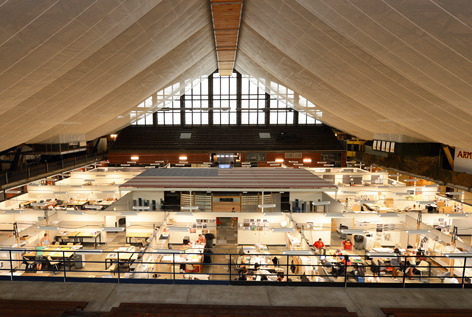
A view from the bleachers of the College of Design's reconfigured studios on the main floor of the Armory. Photo by Bob Elbert.
Call it Extreme Makeover: Armory Edition.
With the growth of the undergraduate industrial design program -- established with a class of 20 in 2010 and now accepting 36 new students annually -- the College of Design needed space in the Armory for an additional studio as well as increased capacity for group critiques.
"We saw opportunities to create greater efficiencies and put seven sections of architecture and landscape architecture into what formerly was six studio spaces while adding a studio for industrial design," said Michael Miller, the college's director of operations.
"We also enhanced the center critique space to accommodate 80 to 100 students, improved security and simplified access to the studios," he said.
The reconfigured space was designed by 19 architecture, landscape architecture and interior design students in Bruce Bassler's design-build studio last spring. The class finished three studios and the critique area during the semester; a contractor completed the remaining studios over the summer.
"The creative challenge for us was, how do you turn space for six studios into seven and expand the review space and not make all the studios smaller?" said Bassler, associate professor of architecture.
Finding efficiencies
By examining circulation patterns, students found they could eliminate the warren of aisles around the center as well as a redundant hallway along the south side of the studios in favor of a single central hallway to gain square footage and provide more efficient access into the studios.
Bassler said the class secured the support of other occupants affected by the project -- the ISU police and parking divisions and the three ROTC units housed in the Armory -- to incorporate the south hallway into the college's space.
"This allowed us to do studios the same size as before or even a little larger along with the larger review space. It's a minor miracle," he said. "And security is better because now we have one central hallway with only two entrances into the space whereas before we had nearly a dozen."
Rather than demolish and rebuild walls, students chose to move whole walls intact to new locations. Though a labor-intensive process, it saved time and allowed the class to reuse materials.
The most difficult aspect was the amount of electrical work to be done, Bassler said.
"Since we essentially moved every wall, that meant all electrical had to be relocated. The electrical contractor taught students how to calculate circuits and pull wires and oversaw the work so we could save a lot of money doing it ourselves."
Instead of a costly track-lighting system, students installed utility light fixtures in the existing cable system over the review space. They also laid carpet remnants in a pattern reminiscent of farm fields seen from the air.
"It's a far nicer space than it's ever been," Miller said. "The furniture, while not new, also has been refurbished -- we redid the desktops and installed new concrete tops and threaded-rod handles for the flat files so they're all usable again."
All studios were ready for students to start classes on Aug. 20. As part of one of the college's strategic initiatives, the project was funded primarily by the provost's office.
College of Design students have had studio space at the Armory since the mid-1990s. Studios for first-year students moved to the King Pavilion when it opened in 2009; third-year architecture and landscape architecture studios remained in the Armory. In 2010, after the industrial design program was approved, those students were assigned spaces in the Armory, too.
University awards ceremony is Sept. 21
The Iowa State community is invited to the 2012 university awards ceremony on Friday, Sept. 21 (3:15 p.m., Memorial Union Sun Room). Recipients of the university's most distinguished awards for faculty and staff will be honored. A reception will follow.
Coming on the heels of president Steven Leath's formal installation this week, the awards ceremony will differ from the university's typical fall convocation. Leath will share his vision for Iowa State at the installation ceremony, leaving award presentations as the main feature on Sept. 21.
Among the faculty who will be recognized are Iowa State's newest Distinguished Professors Dan Shechtman (materials science and engineering) and Jonathan Wendel (ecology, evolution and organismal biology); and University Professors Steven Herrnstadt (art and design), Gordon Miller (chemistry) and James Oliver (mechanical engineering).
All are welcome to attend.
Wind energy degree approved by senate
Faculty Senate representatives kicked off the academic year at their first meeting Sept. 11, unanimously approving a new multidisciplinary doctorate in wind energy science, engineering and policy. The Ph.D. program will involve 12 departments in three different colleges (Engineering, Agriculture and Life Sciences, and Liberal Arts and Sciences).
Naming rights
As part of the consent agenda, senators also endorsed a department name change for the Roy J. Carver Department of Biochemistry, Biophysics and Molecular Biology. The new name acknowledges a $7.5 million gift from the Carver Charitable Trust. The state Board of Regents approved the name change in June.
Concerns about the future of department "naming rights" were discussed. Although the Faculty Handbook requires senate approval for department name changes, past president Steve Freeman said a "loophole" in the policy bypassed that requirement in this case because the academic component of the department did not change.
"I have asked the governance council to consider this," said senate president Suzanne Hendrich. "You will be hearing more about this in the near future on the floor of this body."
Wickert debut
Senior vice president and provost Jonathan Wickert addressed the senate for the first time in his new academic post. He reported that 84 new tenure-track and tenured faculty were hired this year, while just 34 left as a result of retirement or resignation.
"That represents real growth in the faculty ranks," Wickert said.
Wickert also shared president Steven Leath's initiative on institutional excellence. He said task forces have been created to focus on five areas:
- Competitively funded federal research
- Membership in national academies
- Articles, scholarly work and citations
- Arts and humanities awards, fellowships and memberships
- Increasing doctoral degrees and postdoc appointments
"Our goal is strengthening our position within [the AAU]," Wickert said. "The types of things that one wants to do to strengthen the position in the AAU are the right things to do because it makes Iowa State better."
Post-tenure review results
Senators received a summary report of the 82 post-tenure reviews scheduled in 2011-12. Two scheduled reviews were postponed and one more was not completed. The remaining cases were categorized into three possible overall ratings:
- Superior (16)
- Meeting expectations (59)
- Below expectations (4)
Salary increments were recommended for eight of the nine full professors who received superior ratings, while all seven associate professors were encouraged to prepare for promotion reviews.
Other business
A report (PDF) on a senate committee's review of the Office of the Executive Vice President and Provost is available on the Faculty Senate website. Senators accepted the 145-page report as part of the consent agenda.
Time for a flu shot
Flu season is fast approaching, so mark your calendars for the upcoming flu shot clinic.
Occupational medicine staff will administer flu shots at no cost to employees (while supplies last) weekdays from Oct. 3 to Oct. 19 (10 a.m.-4 p.m., 205 Technical Administrative Service Facility). No appointment is necessary. Be sure to bring your ISU ID card or your university ID number to the clinic. There is limited parking in front of TASF.
Flu shots will be provided at no cost for the following groups:
- Faculty
- Merit
- Professional and scientific
- University Child Care employees
- Miscellaneous affiliate employees enrolled in ISU health plans (ISU Foundation, Iowa State Daily, Greek house directors). Some affiliate organizations will need to pay for their participating employees' vaccinations.
- Retirees on university health plans who are not yet 65
Students, post docs and visiting scholars are not eligible to receive flu shots at the clinic in TASF. These individuals should contact the Thielen Student Health Center, 4-5801, for flu vaccine information.
Employees are encouraged to get vaccinated as soon as possible during the specified October time frame. For more information, call 4-0874.
Now you see it, now you don't
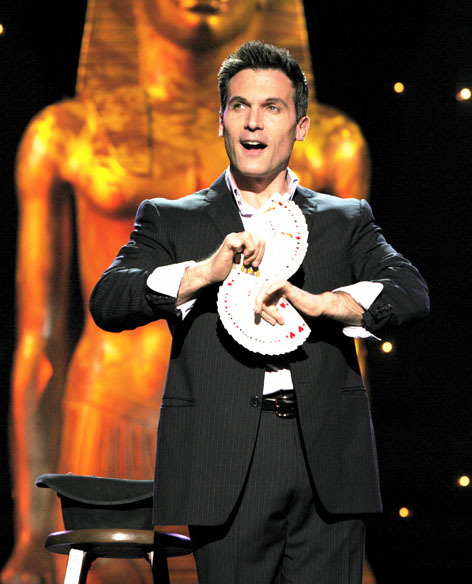
Submitted photo.
Stephens Auditorium kicks off its 2012-13 Performing Arts Series at 7:30 p.m. on Sept. 20 with a magical, family-friendly performance by the "Masters of Illusion."
Featuring everything from exotic animals, to quick changes, to great escapes, "Masters of Illusion" boasts 25 of the world's most famous magicians, comedians, illusionists and escape artists. Audience members even can be part of the act, if they choose.
Tickets, $49 and $53 ($38 for youth; $30 for students), are available at the Iowa State Center ticket office or through Ticketmaster. Ticketholders also are invited to attend a preshow event at 7 p.m. in the Celebrity Café (ground floor of Stephens, north entrance) featuring the show's producer, Gay Blackstone. Submitted photo.
